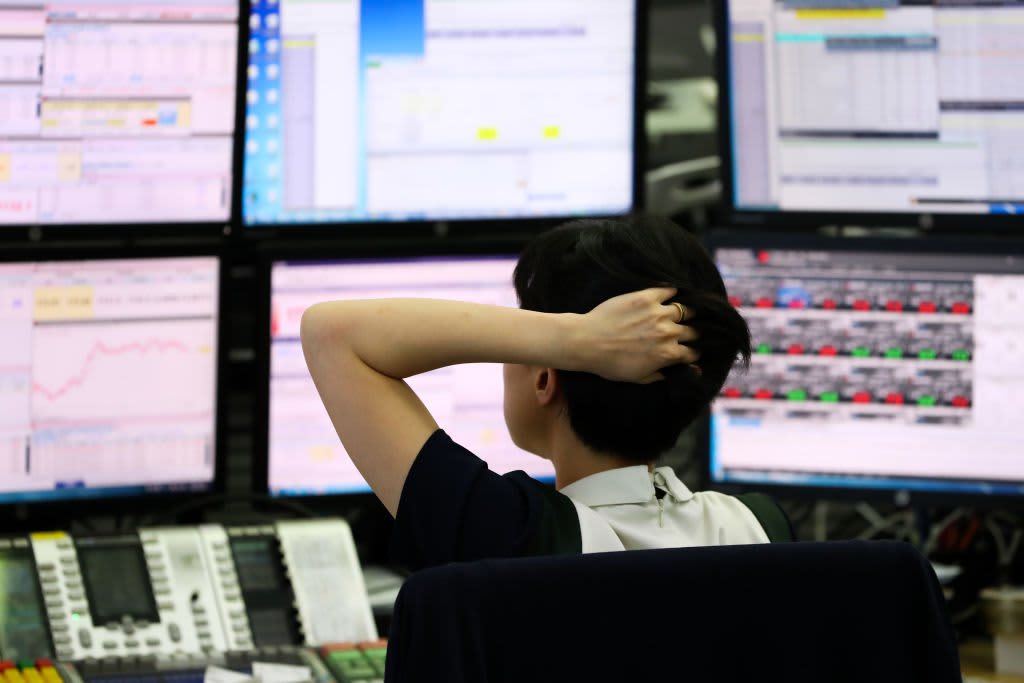
A foreign currency dealer looks at a monitor in a dealing room.
SeongJoon Cho | Bloomberg | Getty Images
SINGAPORE — Asia-Pacific markets lost steam mid-morning on Monday, with Hong Kong shares down more than 2%.
That was despite improved sentiment around coronavirus vaccine rollouts and U.S. stimulus hopes, which fueled a record-setting session Friday on Wall Street.
Australia’s benchmark ASX 200 was up 0.36%, trimming some of its earlier gains of more than 1%. Energy and mining stocks were mostly up — shares of Rio Tinto rose 2.03%, Woodside Petroleum was up 0.33%, Fortescue was up 3.76% and BHP added 1.87%.
Japanese markets struggled for gains: The Nikkei 225 gave up early gains to trade down 0.4% while the Topix index also fell 0.47%. South Korea’s Kospi index reversed gains to trade down 0.15%.
Chinese mainland shares fell: The Shanghai composite was down 0.74%, the Shenzhen composite declined 0.31% and the Shenzhen component dropped 0.48%.
In Hong Kong, the Hang Seng index fell 2.1%. Major indexes in Indonesia, Malaysia and Philippines traded up.
Singapore’s Straits Times Index fell 0.25% on Monday. Shares of Singapore Telecommunications rose 5.13% after the telco, along with tech company Grab, last week won a license to operate a digital bank in Singapore.
Vaccine hopes
Markets are in a “sweet spot” where rallies are “seduced by the promise of more stimulus intersecting with vaccine hopes; overriding near-term vulnerabilities,” said Vishnu Varathan, head of economics and strategy at Mizuho Bank’s Asia and Oceania treasury department.
He wrote in a Monday morning note that the U.S. as well as the global economy are far from out of the woods. “In fact, if anything, record high new infections and US jobs disappointment point to the risks of air pockets interrupting this recovery,” Varathan said.
Companies Pfizer and Moderna have applied for emergency authorization from the U.S. Food and Drug Administration for their coronavirus vaccines. They could be given the green light at some point in mid-December.
Meanwhile, the U.K. last week became the first country to authorize Pfizer’s vaccine, which was developed with BioNTech.
Though market reaction to the positive vaccine news has mostly been jubilant, there remains a “fairly long lag between vaccine approval and effective vaccination on a wide-enough scale globally,” Varathan wrote. That could span anywhere between six to 12 months, he said, adding, that even with vaccination there is “no guarantee an automatic and swift reversion to pre-COVID levels and rates of growth.”
Currencies and oil
In the currency market, the U.S. dollar traded at 90.725 against a basket of its peers. The dollar index fell from levels near 91.80 last week.
The U.S. dollar is expected to remain on a downtrend this week, according to currency strategists at the Commonwealth Bank of Australia.
“The recovering world economy undermines demand for the (dollar),” the strategists wrote in a Monday morning note. “Even if some economic data released this week is soft, we expect market participants to heavily discount it because the distribution of vaccines starting this month improves the medium-term economic outlook.”
The Japanese yen changed hands at 103.97 against the greenback, strengthening from an earlier level around 104.23. The Australian dollar traded up 0.15% at $0.7432.
Oil prices traded lower Monday during Asian hours. U.S. crude futures were down 0.56% at $46 a barrel while global benchmark Brent traded down 0.53% at $48.99.
Source: CNBC
